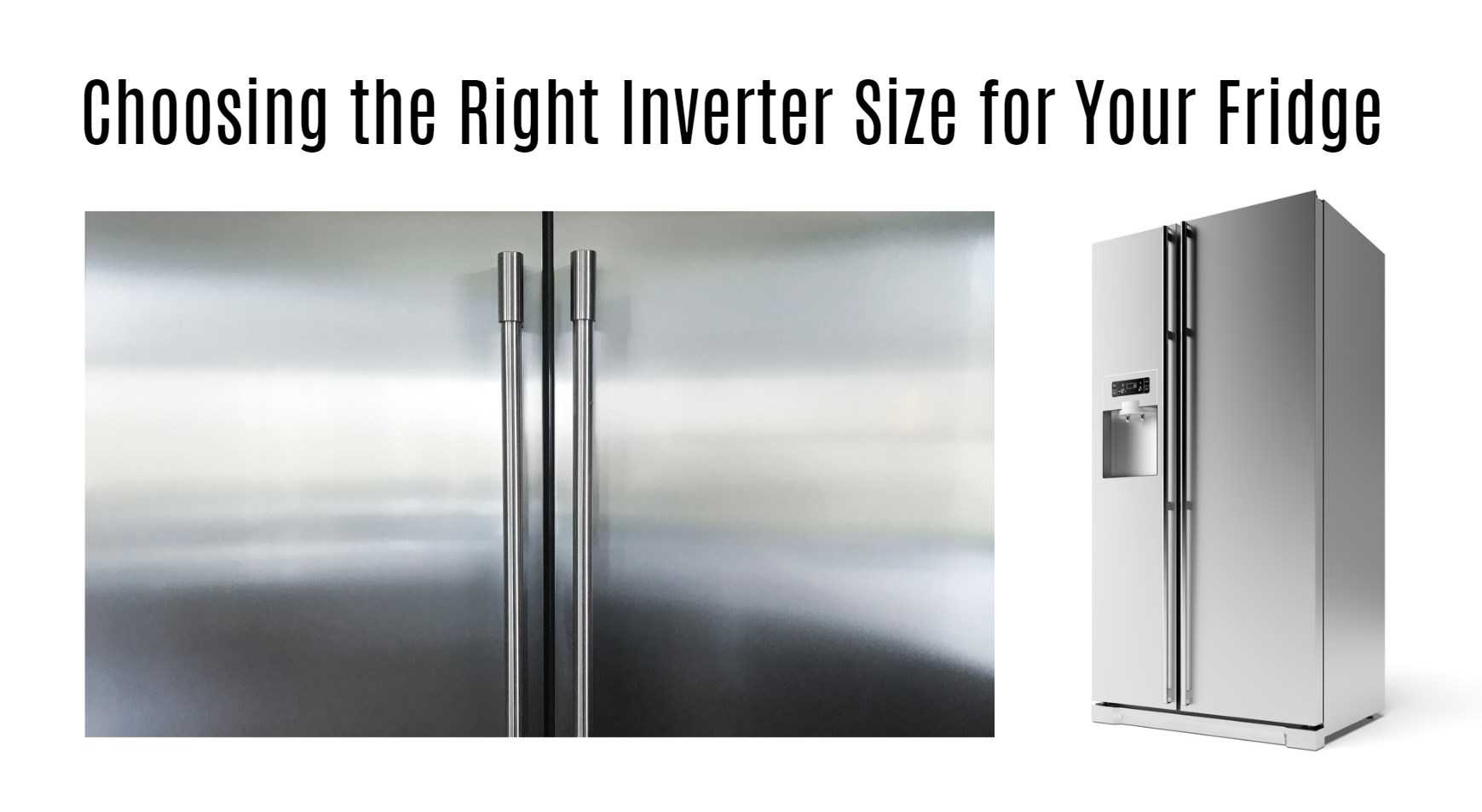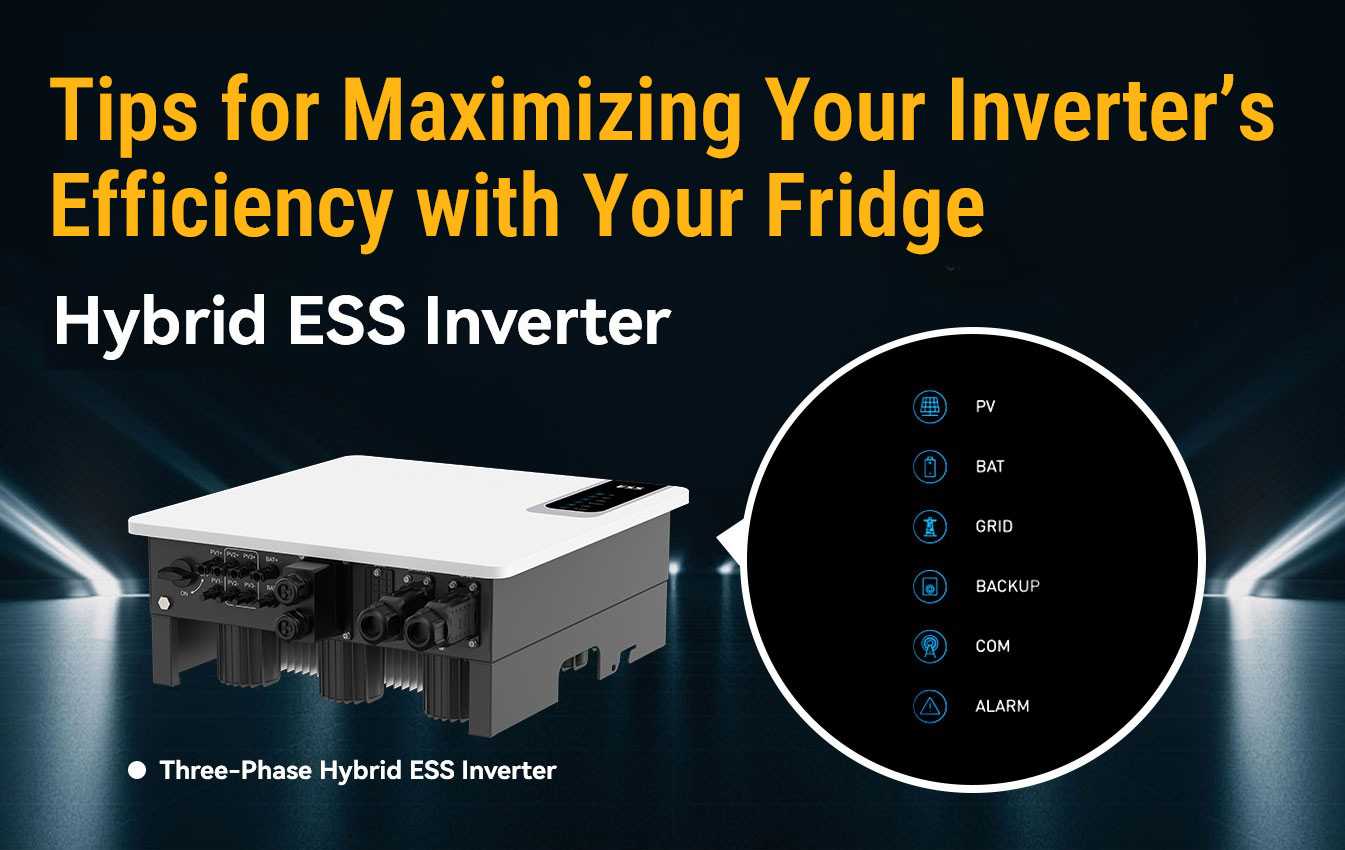Are you tired of worrying about your fridge during power outages? Choosing the right inverter size can be the key to keeping your food fresh and your worries at bay. In this comprehensive guide, we’ll walk you through everything you need to know about selecting the perfect inverter for your fridge. Say goodbye to spoiled groceries and hello to reliable power backup – let’s dive in!
Understanding Inverters and Their Importance in Power Backup Systems
Inverters are the unsung heroes of power backup systems, quietly working behind the scenes to keep your appliances running smoothly during blackouts. These devices convert DC power from batteries into AC power that your fridge and other electronics can use. So, when the lights go out, your inverter steps up to bat, ensuring you don’t lose all those perishable goodies in your refrigerator.
The importance of choosing the right inverter size cannot be overstated – too small, and it won’t be able to handle the load; too large, and you might end up overspending on unnecessary capacity. Understanding how inverters function and their role in maintaining a reliable power supply is crucial for optimal performance.
When selecting an inverter for your fridge, consider factors like its efficiency rating, surge capacity, and waveform output. By grasping these key concepts, you’ll be better equipped to make an informed decision that meets both your energy needs and budget constraints.
Factors to Consider When Choosing the Right Inverter Size for Your Fridge
When selecting the right inverter size for your fridge, there are a few key factors to keep in mind. Consider the power consumption of your fridge. Look for the manufacturer‘s specifications on energy usage or use a power meter to measure it accurately.
Next, think about any additional appliances you may want to connect to the inverter along with your fridge. Ensure that the total wattage of all devices does not exceed the capacity of the inverter you choose.
Moreover, take into account the starting surge or peak power required by your fridge when it kicks on. This initial surge can be higher than its normal running wattage and should be factored into your calculations.
Consider future needs and potential expansions when deciding on an appropriate inverter size. It’s always better to have some extra capacity rather than risk overloading your system down the line.
Determining the Power Consumption of Your Fridge
When it comes to determining the power consumption of your fridge, it’s essential to start by checking the appliance’s energy label. This label typically provides information on the fridge’s annual energy consumption in kilowatt-hours (kWh).
Additionally, you can use a power meter to measure how much electricity your fridge consumes over a specific period. Simply plug the fridge into the power meter and let it run for a day or two to get an accurate reading.
Another method is to refer to the user manual of your refrigerator, as it often includes details on its power usage. If you don’t have access to this information, you can contact the manufacturer or check their website for specifications.
By understanding how much power your fridge uses, you’ll be able to calculate the appropriate size of an inverter needed for backup during outages effectively.
Calculating the Required Inverter Capacity
Calculating the required inverter capacity for your fridge is crucial to ensure uninterrupted power supply during outages. To determine the right size, start by checking the wattage rating on your fridge’s nameplate or manual. This information will give you an idea of how much power your appliance consumes when running.
Next, consider any additional power requirements like startup surge or compressor cycling which may need extra capacity from the inverter. Factor in inefficiencies and losses that might occur during power conversion.
Once you have these numbers, use a simple formula: Inverter Capacity = Fridge Wattage × 1.5 to safely accommodate fluctuations and unexpected demands. Remember, it’s better to have a slightly larger inverter than one that struggles to meet your fridge’s needs.
By accurately calculating the required inverter capacity for your fridge, you can rest assured knowing you’ve made a smart choice for seamless backup power solutions!
Popular Inverter Sizes for Fridges and Their Capabilities
When it comes to choosing the right inverter size for your fridge, it’s essential to understand the capabilities of different popular sizes available in the market. Inverters typically range from 600VA to 2000VA, with higher capacities offering more power backup.
A 600VA inverter is suitable for small fridges with minimal power consumption, perfect for compact living spaces or as a backup option during short outages. Moving up to a 1000VA inverter provides sufficient power for medium-sized fridges without overloading the system.
For larger refrigerators or if you have additional appliances connected to the same inverter, opting for a 1500VA or 2000VA model ensures reliable performance and efficient operation during extended power cuts. It’s important to match the inverter size with your fridge’s wattage requirements for optimal functionality and longevity.
Consider factors like compressor starting current and any potential future additions when selecting the appropriate capacity to meet your household needs effectively.
Tips for Maximizing Your Inverter’s Efficiency with Your Fridge
When it comes to maximizing your inverter’s efficiency with your fridge, there are a few tips that can help you make the most out of your power backup system. Consider investing in an energy-efficient fridge model to reduce the overall power consumption. This will not only benefit the environment but also help optimize your inverter usage.
Another tip is to keep your fridge well-maintained by regularly cleaning its coils and ensuring proper ventilation around the appliance. A well-functioning fridge will require less energy from your inverter to operate efficiently.
Additionally, organizing your fridge contents strategically can help minimize the time it needs to run, thus reducing strain on your inverter. By keeping similar items together and avoiding overloading the fridge, you can improve energy efficiency and prolong the lifespan of both your fridge and inverter.
Consider setting optimal temperature settings for your fridge based on manufacturer recommendations. Adjusting these settings appropriately can prevent unnecessary energy consumption while still keeping your food fresh and safe.
Conclusion
Choosing the right inverter size for your fridge is crucial to ensure a seamless power backup system. By understanding the power consumption of your fridge, calculating the required inverter capacity, and considering popular inverter sizes, you can make an informed decision.
Remember to factor in peak load requirements and consider future expansion when selecting an appropriate inverter size. Additionally, implementing tips like positioning your fridge efficiently and maintaining it regularly can help maximize your inverter’s efficiency.
By choosing the right inverter size for your fridge, you can enjoy uninterrupted cooling even during power outages. Make sure to assess your needs carefully and invest in a reliable solution that meets both your current and future requirements.
d decision.
To keep the interior of a refrigerator at a constant, cool temperature, the compressor cycles on and off at regular intervals. When it turns on, the refrigerator consumes a significant amount of electricity, with the power surge being three to ten times the continuous watts. Therefore, when considering what size inverter you need to run a fridge, it is important to choose one that can handle both the running power and the surge power.
A general rule of thumb is to select an inverter with a minimum rating of five times the electricity consumption of your refrigerator. For example, if your fridge requires 200W of power, an inverter providing 1000W/2000W (continuous/surge) should suffice. This ensures that the inverter can handle both the constant power required by the fridge and the initial surge power needed to start it.
Powering a fridge with an inverter means that even during a power outage, you can keep your food fresh and avoid any spoilage. Traditional refrigerators have a single-speed compressor that runs at full speed until the desired temperature is reached, whereas smart inverter refrigerators have variable-speed compressors. These compressors can adjust their rotation speed based on the power source available, making them compatible with household inverters.
The runtime of an inverter-backed refrigerator depends on the inverter’s capacity (VA – Volt Ampere) and the battery’s capacity (Ah – Ampere-hours). A smart inverter fridge typically requires at least 90W to function, so taking into account the power consumption of other appliances, the total power consumption during a power outage would be around 185W.
Now, let’s address some common questions practitioners in the energy storage or solar industry may have:
1. What is the minimum inverter size required to run a fridge?
The recommended minimum inverter rating is five times the electricity consumption of your fridge.
2. Can a 750-watt inverter run a refrigerator?
Yes, a 750W inverter can run a refrigerator. However, it is important to consider the surge or peak capacity of the inverter and ensure it is twice as high as the running wattage.
3. Will a 1000-watt inverter run a refrigerator?
Yes, a 1000W inverter can run a refrigerator, especially if it is a newer and more efficient model. It is essential to know the power consumption of your fridge and the rated surge capacity of the inverter.
4. Can a 1500-watt inverter run a refrigerator?
It is not recommended to operate your inverter at maximum capacity. A 1500W inverter can support a 1500W load, but it is important to consider factors such as inverter efficiency, battery size, and cable size.
5. Can a 2000-watt inverter run a refrigerator?
Yes, a 2000W inverter can run a refrigerator, as long as the total power usage of the fridge is less than 4000 watts. Energy-efficient refrigerators with a capacity of 21 to 24 cubic feet typically require 1200 to 1500 watts to operate.
6. Is it necessary to use a pure sine wave inverter for a refrigerator?
Yes, to power a refrigerator, a pure sine wave inverter is recommended. It ensures a smooth and stable flow of electricity, preventing any potential damage to the appliance.
7. What are the factors to consider when selecting the right inverter size for a fridge?
Some factors to consider include the power consumption of the refrigerator, the surge wattage required to start the fridge, the inverter’s efficiency rate, the type of inverter, the battery size, and the cable length.
8. Can multiple appliances be powered by the same inverter?
Yes, multiple appliances can be powered by the same inverter. However, it is important to calculate the total power consumption of all the appliances to ensure the inverter can handle the load.
9. How long can an inverter-backed refrigerator run on battery power?
The runtime of an inverter-backed refrigerator depends on the inverter’s capacity and the battery’s capacity. The exact duration will vary based on factors such as the inverter, the batteries, the user’s habits, and the specific refrigerator type.
10. Are there any energy-efficient refrigerators specifically designed for use with inverters?
Yes, there are energy-efficient refrigerators with smart inverter technology that can be powered by household inverters. These refrigerators have low power consumption, allowing them to keep food cool for extended periods during power outages.
Remember, choosing the right inverter size for your fridge is crucial to ensure uninterrupted operation during power outages. By considering factors such as power consumption, surge wattage, and inverter capacity, you can make an informed decision and keep your food fresh and safe.





